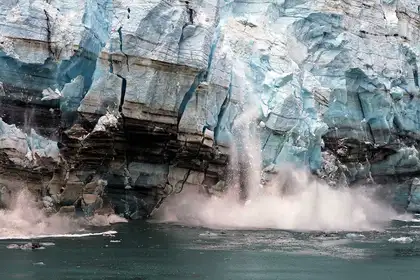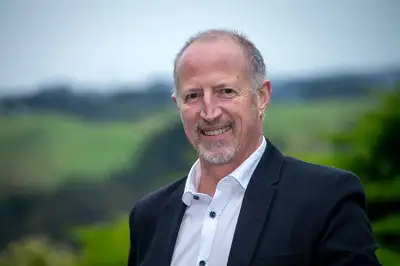
The impact of Antarctic ice sheet collapse caused by increasing carbon emissions is among climate change threats Professor Bruce Glavovic has been researching (photo credit/NOAA-Unsplash).
From Antarctic ice sheet collapse to Whanganui river flooding – there’s not much in the sphere of climate change impacts Professor Bruce Glavovic hasn’t explored as a contributing writer/editor on a range of scientific reports, journals, international panels and research projects. COVID-19 is the latest challenge to add to the mix.
However, we need to be aware of the danger of shifting our focus away from climate change while we deal with the pandemic, says Professor Glavovic, a scientist and natural hazards specialist from Massey University’s School of People, Environment and Planning. “Climate change is not a distant problem – it is arguably the most serious issue facing humanity, even in the midst of this pandemic. In part this is because we have a narrow window of time – perhaps only decades – to avert dangerous levels of global warming.
“COVID-19 is ravaging people around the world and deserves the attention it is getting,” he says. “But neglecting the imperative for climate change action will have dire and potentially irreversible impacts on human well-being and planetary health.”
We should not allow our understandable COVID-19 concerns to eclipse climate change issues because they are interlinked, Professor Glavovic warns. “We may see more COVID-type zoonotic (diseases that pass from animals or insects to humans) viruses in the future as an inseparable symptom of climate change, development patterns and social inequity.
Pandemics, poverty and climate change are connected
“We face interconnected crises, from the pandemic to climate change, biodiversity loss, poverty and injustice which interact in complex ways to create the conditions for such viruses to occur and spread; driven by development trajectories that are inequitable and unsustainable.”
Professor Glavovic says the disruption of the current pandemic presents an opportunity to develop new economic policies and new ways of working together to address the economic fall-out from COVID-19 and climate change and related perils, from sustainability and poverty to injustices like gender and pay inequity.
He is adamant we can no longer separate climate change from other development and sustainability issues – because poverty, hunger, homelessness, unemployment and injustice are all linked socio-environmental issues that directly determines human existence and well-being. “COVID-19 is a chance to re-set our priorities and find new ways to do things that are good for people and the planet.”
He says good government decisions in managing COVID-19 in New Zealand have given us an advantage. “To a large degree this is because of high levels of trust in this government – this should be a reminder that with good leadership we can swivel and make the changes needed to deal with an urgent problem. Why can’t the same be applied to climate change?”
He believes more engagement with tangata whenua in seeking climate change solutions and effective ways to manage our relationship with one another and the natural world is the way forward. Te Ao Māori offers traditional wisdom, practices, protocols and philosophies that encompass physical, social, livelihood and spiritual elements, while honouring intergenerational and human-nature connections, he says.

Professor Bruce Glavovic
A window of time - but we are running out
Professor Glavovic has been immersed in climate change research across a wide range of organisations, including as Coordinating Lead Author for Sea Level Rise chapter of the IPCC’s (Intergovernmental Panel on Climate Change) Special Report on the Ocean and Cryosphere in a Changing Climate. It was published late last year and was the focus of hundreds of news articles. It documents a litany of pending and accelerating coastal and ocean risks, including Antarctic ice sheet collapse due to increasing carbon emissions, and increasingly ferocious tropical storms, inundation and flooding that imperil many coastal communities and habitats.
His work for IPCC continues, with the sixth assessment underway to produce in 2021 the next global assessment of climate change. He is lead author of the chapter on Climate Resilient Development Pathways for the IPCC’s Working Group II report on climate change impacts, adaptation and vulnerability. He is also co-leading a cross-chapter paper on Cities and Settlements by the Sea.
In Aotearoa, he was appointed to Auckland Climate Independent Advisory Group, and is also leading a strategy development process for Horizons Regional Council, “to determine how to reduce risk and build resilience along Anzac Parade, Whanganui, which has flooded a number of times, recently in 2015; and for which some form of managed retreat may be warranted.”
Further afield, he was recently appointed co-editor in chief of the Journal Ocean and Coastal Management – a leading international journal addressing coastal and marine governance, policy and management issues. This role includes guest editing special issues on coastal risk governance in BRICS countries; and coastal management in the face of Covid-19.
He is involved in several international research projects, including a project involving teams in South Africa, Brazil, China and India, on coastal risk governance; a Norway-New Zealand comparative analysis on how we respond to changing seasons; and, with teams in Sweden, the USA, Brazil, India, Norway and South Africa, how to transform conflicts to advance ocean sustainability.
Learnings from Christchurch
Among upcoming publications, he is currently collaborating on a book on the decade of disaster experiences since the 2010-11 earthquake series in Christchurch. “We cover the earthquakes as well as the many other perils experienced in Christchurch over the last decade – including flooding, sea level rise, and the Mosque massacre. We offer a critical social science perspective on the drivers of vulnerability to harm and highlight the many creative ways people are building a future laced with hope, despite the many challenges faced.”
Professor Glavovic says much of his work has arisen with colleagues around the world through his involvement as Co-Chair of the Executive Committee of Future Earth Coasts. It began in 1993 (under the title Land Ocean Interactions in the Coastal Zone) and its’ goal is to “generate the knowledge needed to advance sustainability of coastal socio-ecological systems.”
Professor Glavovic says his work with communities to develop risk management strategies and collaborative solutions gives him reason to remain hopeful – despite the litany of complex challenges face humanity.
“We have a window of time to stem dangerous levels of global warming, but we are running out. The Aotearoa response to COVID-19 shows that we can work together for the common good. We can also address the drivers of climate change – by focusing on transforming those practices that prevent us from meeting shared human needs, achieving equity and justice, and living within the environmental limits of our finite planet.”